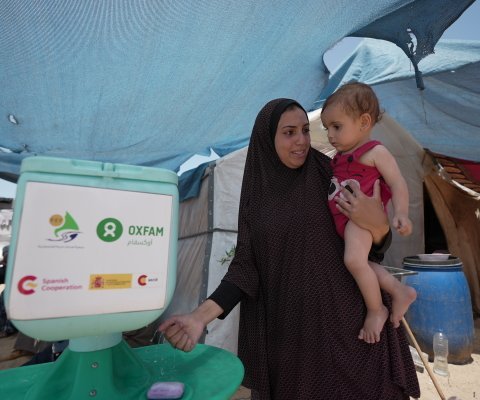Oxfam expressed dismay at the third consecutive annual rise in global hunger. The United Nation published its annual report on global food security and nutrition today, estimating that 821 million people were undernourished in 2017.
“Oxfam is dismayed at this third consecutive year of rising hunger. We’re back to where we were a decade ago,” said Winnie Byanyima, Oxfam International’s executive director. “As ever, hunger is caused by human actions that drive poverty and inequality, conflict and war, poor governance, wastage, and worsening climate change.”
While many think hunger is about too many people and too little food, hunger is actually about power, with roots in inequalities in access to resources and opportunities, according to Oxfam. And women face the greatest inequalities of all.
“It takes a real effort to feed people, just as it takes a real effort to leave them starving and deprived in such huge numbers,” continued Byanyima. “We must do more to push our political leaders to create the opportunities for every citizen to access the food they need to survive, safely and affordably. This includes redoubling efforts to resolve conflict and war, cutting our use of fossil fuels and raising funds for poor countries to help them adapt to climate crises. We know what’s needed – it comes down to political will.”
According to the UN, more complex, frequent, and intense climate extremes was a leading cause of food crises in 2017, leaving 94.9 million people having to rely on some kind of humanitarian aid to feed themselves. According to Oxfam, the impacts of climate change are set to devastate food production by drying up and washing away poor people’s cropland and harvests. Yields will fall and crop prices will increase and become more volatile. And the production of cereals will fall among the most vulnerable populations, leading to reduced calorie intake and increased child malnutrition.
“With every farmer that loses a harvest due to unpredictable storms and every herder that sees their livestock starve to death during droughts, the promise of meeting UN development targets slips ever further away,” continued Byanyima. “Oxfam will keep fighting on behalf of every one of those 821 million people who go hungry. To us they are not a number, they are our cause. They need real solutions – not just food.”
Oxfam and its local partners worked in more than 35 countries specifically delivering humanitarian food aid last year, including more than 320,000 Yemenis with cash to buy food. Last month, Oxfam reached 144,000 Rohingya refugees in Cox’s Bazaar, Bangladesh with fresh food vouchers. Every month Oxfam takes part in emergency food drops for 260,000 people in South Sudan, a country the organization has worked in since 1983, but which is still experiencing conflict, and ongoing hunger as a result.





